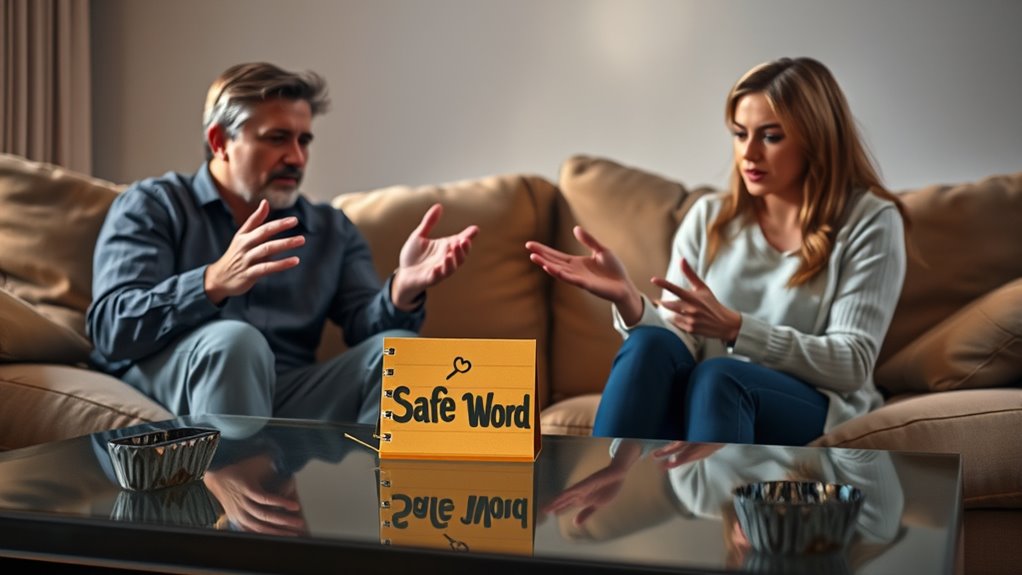When arguments heat up, using a safe word helps you step back and manage your emotions effectively. It signals that things are getting overwhelming and it’s time to pause, allowing both of you to breathe, collect your thoughts, and prevent escalation. This boundary promotes respectful communication and keeps the focus on resolving issues rather than fighting. Staying mindful of your safe word can strengthen your connection; uncover more ways to make fights healthier with what’s coming next.
Key Takeaways
- Using a “safe word” allows both partners to pause and prevent escalation during heated arguments.
- It creates a clear boundary, signaling when emotions are overwhelming and a break is needed.
- Implementing a safe word fosters respectful communication and mutual understanding.
- It helps shift focus from impulsive reactions to thoughtful, constructive dialogue.
- Employing a safe word demonstrates maturity and commitment to healthier conflict resolution.

When arguments start to heat up and emotions run high, it’s easy for conversations to spiral out of control. During these moments, emotional regulation becomes vital. Instead of letting anger or frustration take over, you can use a simple tool—a “safe word”—to pause the escalation. This word acts as a signal to both parties that it’s time to step back, regroup, and prevent the situation from spiraling into unproductive conflict. Using a safe word isn’t about avoiding conflict; it’s about managing it more effectively. It helps you maintain control over your reactions, which is essential for conflict resolution. When you recognize that emotions are becoming overwhelming, saying the safe word provides a clear boundary, giving both of you space to collect your thoughts.
Using a safe word helps manage conflicts, maintain control, and create space for thoughtful resolution.
Implementing a safe word creates a structured way to handle heated discussions. It shifts the focus from reacting impulsively to engaging thoughtfully. When you or your partner invoke the safe word, it’s a reminder that your goal isn’t to “win” the argument but to resolve the conflict in a healthier way. This pause allows you to breathe, acknowledge your feelings, and approach the situation with more clarity. You might use the safe word after noticing rising tension, raised voices, or hurtful language. It’s a way to acknowledge that the conversation has reached a point where it’s no longer productive, and it’s time to reset.
Using a safe word also fosters mutual respect. It shows that both of you are committed to emotional regulation and healthy conflict resolution. Instead of pushing through discomfort or letting frustration fester, the safe word signals that your relationship’s well-being takes priority. It encourages honesty and openness, as both of you agree beforehand to honor the pause. As a result, you’re less likely to say things you’ll regret later. When emotions are intense, quick tempers can lead to misunderstandings or damage to trust. The safe word acts as a buffer, helping you navigate those moments without losing sight of your shared goal: understanding and connection.
In the end, incorporating a safe word into your conflicts isn’t a sign of weakness; it’s a sign of strength. It shows maturity and a commitment to emotional regulation. By respecting this boundary, you’re actively working toward more effective conflict resolution, reducing the risk of long-term damage, and fostering a healthier, more respectful relationship. Recognizing the importance of retail hours and scheduling accordingly can also help reduce stress and misunderstandings in daily life. When used thoughtfully, a safe word becomes a powerful tool that turns heated arguments into opportunities for growth, understanding, and stronger connection.
Frequently Asked Questions
How Do I Choose an Effective Safe Word?
When choosing an effective safe word, you want something that’s easy to remember and distinct from everyday language. It should clearly signal your need to pause, respecting your communication boundaries and emotional safety. Pick a word that feels natural but unlikely to come up in regular conversation. Make sure both you and your partner agree on its meaning, ensuring it’s a true cue to stop and reconnect calmly.
Can Safe Words Work in All Types of Disagreements?
Safe words can work in many disagreements, but their effectiveness depends on clear communication boundaries and mutual understanding. You need to establish trust and ensure both parties value emotional safety. While safe words help pause heated moments, some conflicts might require different approaches. If used consistently and respectfully, they can create a safe space for honest conversations, but they aren’t a universal solution for every disagreement.
What if My Partner Forgets the Safe Word?
If your partner forgets the safe word, it’s important to prioritize communication boundaries and emotional safety. You should gently remind them of the agreed safe word and discuss its significance, ensuring both of you feel heard and secure. Consider establishing visual cues or signals as backup. Making this a part of your ongoing conversation helps reinforce trust and keeps your relationship emotionally safe, even if the safe word gets overlooked.
Are There Alternative Methods to Calm Heated Arguments?
You might worry that without a safe word, conflicts will spiral out of control, but alternative conflict resolution techniques can help. Focus on emotional regulation strategies like deep breathing or taking a timeout, which allow both of you to cool down. Active listening and expressing feelings using “I” statements can also de-escalate heated moments. These methods foster understanding and keep arguments constructive, even if a safe word isn’t in play.
How Do I Introduce the Safe Word Concept to My Partner?
You can introduce the safe word concept by calmly discussing communication boundaries and emotional safety with your partner. Explain that a safe word is a tool to guarantee both of you feel secure during disagreements. Suggest choosing a simple word beforehand, and emphasize it’s about mutual respect. When emotions run high, using the safe word helps pause the argument, allowing both of you to regain composure and continue constructively.
Conclusion
Next time tempers flare, remember a safe word can be your lifeline. It’s a simple tool to pause, breathe, and reset before things spiral out of control. Imagine a calm space amid chaos—doesn’t that sound worth trying? Using a safe word isn’t about avoiding conflict; it’s about handling it wisely. So, why not give it a shot? Your relationship’s peace might just depend on that one little word.










